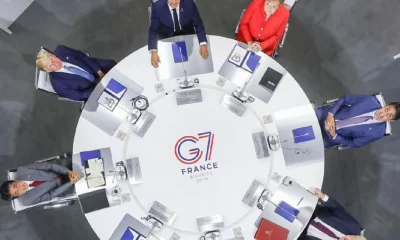NEWS
Climate Change: Not As Alarming As We Believed


Experts now say there is a two-in-three chance of keeping global temperatures within 1.5 degrees above pre-industrial levels, the ultimate goal of the 2015 Paris Agreement.
Climate change poses less of an immediate threat to the planet than previously thought because scientists got their modelling wrong, a new study has found. New research reveals the world is being polluted and warming up less quickly than 10-year-old forecasts predicted, giving countries more time to get a grip on their carbon output.
An unexpected “revolution” in affordable renewable energy has also contributed to the more positive outlook.
We’re in the midst of an energy revolution and it’s happening faster than we thought
Professor Michael Grubb, University College London
According to the models used to draw up the agreement, the world ought now to be 1.3 degrees above the mid-19th-Century average, whereas the most recent observations suggest it is actually between 0.9 to 1 degree above.
The discrepancy means nations could continue emitting carbon dioxide at the current rate for another 20 years before the target was breached, instead of the three to five predicted by the previous model.
“When you are talking about a budget of 1.5 degrees, then a 0.3 degree difference is a big deal”, said Professor Myles Allen, of Oxford University and one of the authors of the new study.
Published in the journal Nature Geoscience, it suggests that if polluting peaks and then declines to below current levels before 2030 and then continue to drop more sharply, there is a 66 per cent chance of global average temperatures staying below 1.5 degrees.
The goal was yesterday described as “very ambitious” but “physically possible”.
Another reason the climate outlook is less bleak than previously thought is stabilising emissions, particularly in China.
China has now acquired more than 100 gigawatts of solar cells, 25 per cent of which in the last six months, and in the UK, offshore wind has turned out to cost far less than expected.
Professor Michael Grubb, from University College London, had previously described the goals agreed at Paris in 2015 as “incompatible with democracy”.
But yesterday he said: “We’re in the midst of an energy revolution and it’s happening faster than we thought, which makes it much more credible for governments to tighten the offer they put on the table at Paris.”
He added that President Trump’s withdrawal from the agreement would not be significant because “The White House’s position doesn’t have much impact on US emissions”.
“The smaller constituencies – cities, businesses, states – are just saying they’re getting on with it, partly for carbon reduction, but partly because there’s this energy revolution and they don’t want to be left behind.”
The new research was published as the Met Office announced that a “slowdown” in the rate of global temperature rises reported over roughly the first decade of this century was now over.
The organisation said the slowdown in rising air temperatures between 1999 and 2014 happened as a result of a natural cycle in the Pacific, which led to the ocean circulation speeding up, causing it to pull heat down in the deeper ocean away from the atmosphere.
However, that cycle has now ended.
Claire Perry, the climate change and industry minister, claimed Britain had already demonstrated that tackling climate change and running a strong economy could go “hand in hand”.















